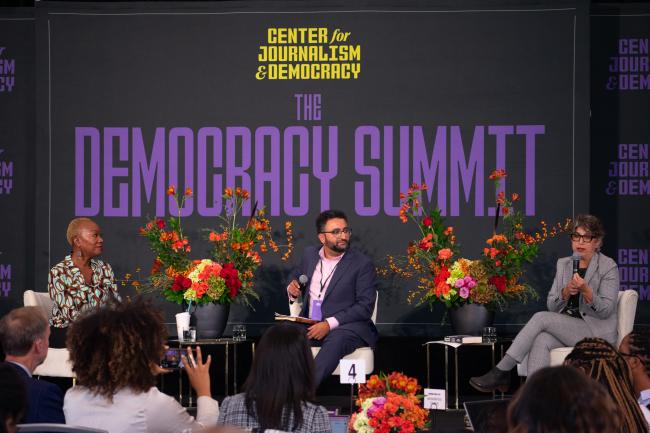On Tuesday (Oct. 8), the Center for Journalism and Democracy (CJD) welcomed journalists from across the country to its third annual Democracy Summit, a day-long convening of both beginner and veteran journalists seeking to address some of their field’s – and the nation’s – most pressing issues.
The theme of this year’s Summit, “Covering Oligarchy,” highlighted the increasing and multifaceted ways in which monocratic forces are pervading American democracy.
Nikole Hannah-Jones, the Center’s founding director, greeted the attendees to “a knowledge exchange” to start the morning, emphasizing the importance of their presence during what she described as a “critical period” in the country.
“Our ethos must be truth – not a false sense of balance where balance doesn’t exist in an unbalanced political system – but what is the truth?” Hannah-Jones said in her opening remarks.
What Is An Oligarchy?
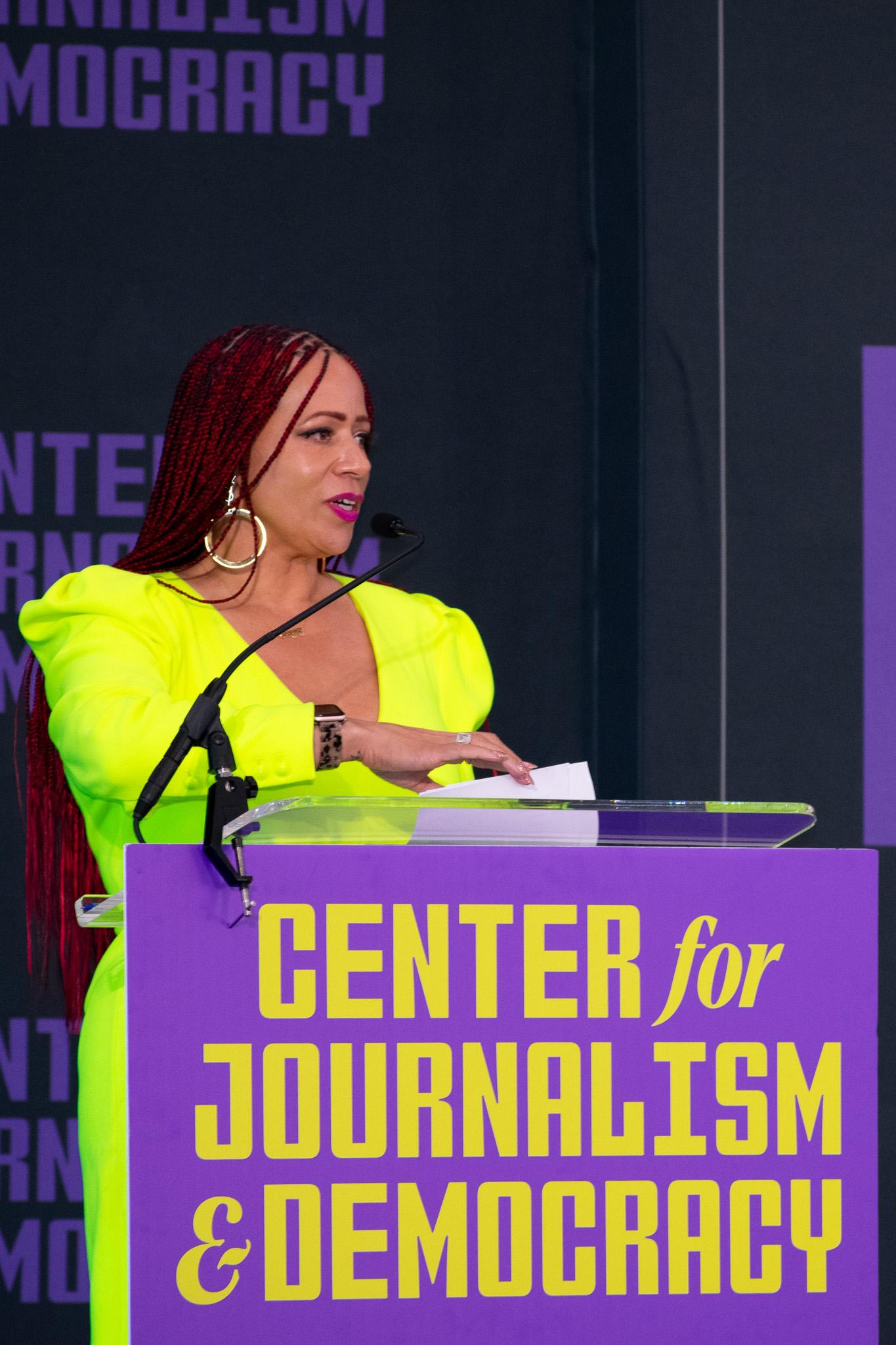
The morning’s agenda included intertwining expert talks by Northwestern University’s Jeffrey Winters on how to define an oligarchy; Stetson University College of Law’s Ciara Torres-Spelliscy on how dark corporate money is influencing American elections; and Justice Speaks’ Jane Chung and The 19th’s Errin Haines on Big Tech’s eroding effect on American democracy. MSNBC’s Joy-Ann Reid also moderated a panel with Oxfam America’s Nabil Ahmed and investigative journalist Andrea Bernstein on how the United States has become increasingly oligarchic.
Winters defined an oligarch as “simply someone who is empowered by wealth,” and explained that part of the issue with the term in the American context is that it has taken a more contemporary meaning as opposed to its historical one that dates back 2000 years.
“Oligarch is a term that has always described someone who has a power position,” Winters said. “And by the way, oligarch is not necessarily an ethical term. … It’s an empowerment position. What you do with your power is what matters.
“Just because someone is called an oligarch does not necessarily mean they are evil, and it doesn’t even necessarily mean that they are against democracy,” Winters continued. “One could use oligarchic power to undermine oligarchy – that’s entirely possible. There aren’t many examples of that, but it can be done.”
During their panel, Reid questioned whether the United States has long been an oligarchy, noting that “America was founded by rich planters who created a country and wrote a constitution specifically for their own financial and economic benefit.” Ahmed agreed but added that this period of oligarchy is starker than any other period in American history.
“We’re also actually living in the Second Gilded Age, and I don’t mean that as a slogan,” Ahmed said. “If you look at the .00001%, that segment of the American population today holds more wealth than it did in that Gilded Age of the Rockefellers and the Carnegies.”
Wealth’s Impacts On Education, Justice Systems
In the afternoon, Michigan State University’s Joshua Cowen presented on how billionaires are influencing K-12 education. The day’s formal programming concluded with a panel moderated by NPR’s Tonya Mosley on the integrity of the U.S. Supreme Court, featuring ProPublica’s Justin Elliott and Howard University School of Law’s Sherrilyn Ifill.
Senior broadcast journalism major and Afro American studies minor Trinity Webster-Bass asked Cowen the supposed benefits behind an education voucher system, and whether the families supporting these policies are aware of the system’s “overall implications.”
“Individual parents are going to have to make choices, and you can’t sort of make the choice based on big-think topics like we’re dealing with today necessarily if your kid is being ill-served in your community and there is an option,” Cowen said. “But I would say, just structurally and long-term, part of the endgame here is eroding public school funding, is eroding confidence in public schools, and is creating conditions where everything is privatized, and parents have to make those choices just to keep their kids’ economic future intact.”
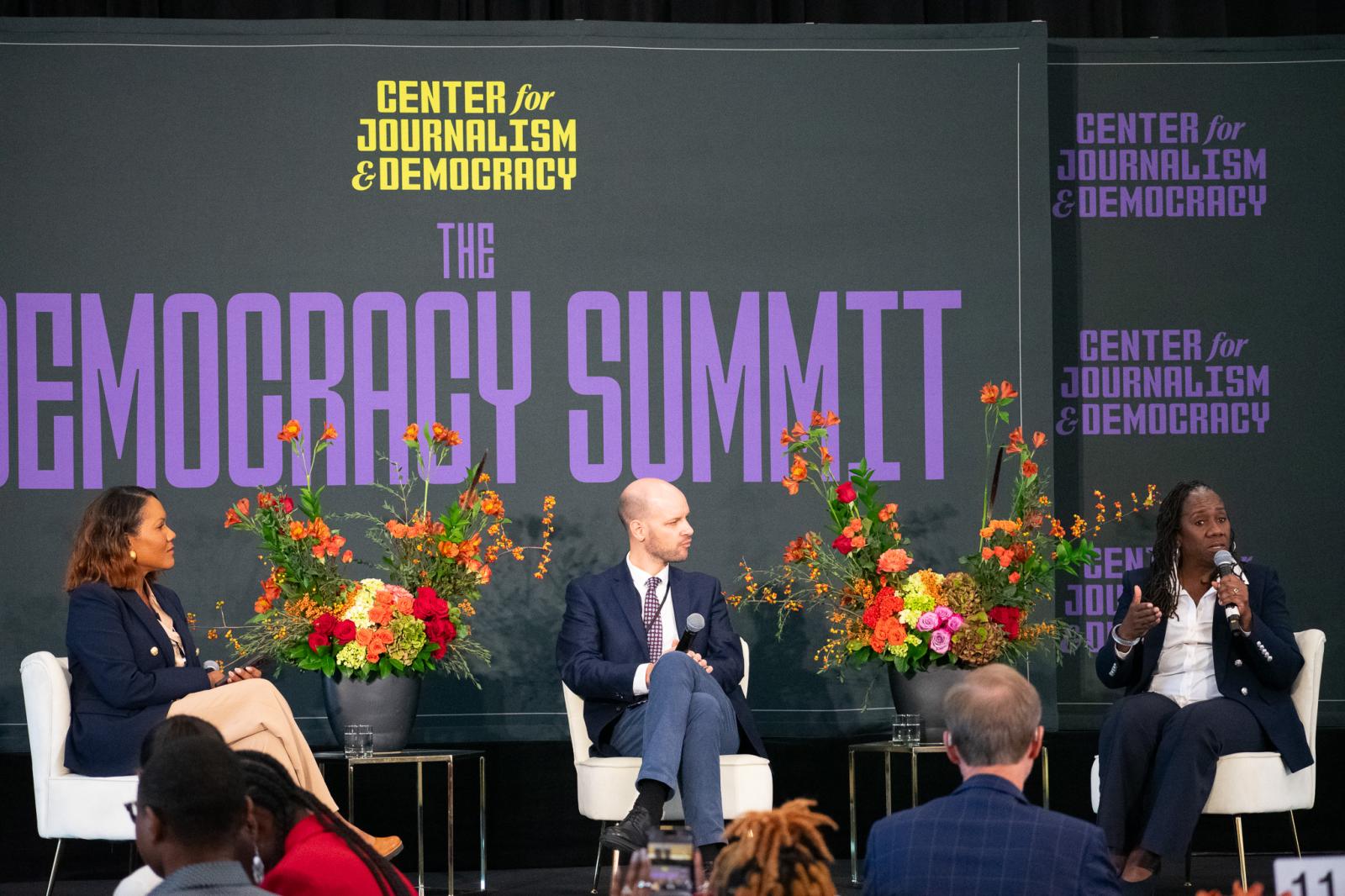
On the day’s final panel, Mosley, Elliott, and Ifill discussed Elliott’s reporting which revealed the capitalistic impulses that have begun pulling at some of the Court’s conservative justices, and how those motivations jeopardize the Court’s reputation.
Ifill cited the experiences of former justice and Howard Law alumnus Thurgood Marshall, as well as her own as director of the NAACP Legal Defense Fund when discussing the financial concessions often inherent to public service roles.
“When you take these jobs, you’re engaging in sacrifice, and you know that from the very beginning,” Ifill said. “And if you’re not able to maintain that, then it’s a character issue.”
“If you found yourself in some sort of litigation in a courtroom setting, and it turned out the judge had been on a paid luxury vacation by the person on the other side of this case, wouldn’t you want to know about that?” said Elliott. “I think obviously the answer is yes. It’s really not even a political issue.”
Post-Summit Reflections
With the 2024 elections looming, CJD executive director Kali-Ahset Amen, Ph.D., said a primary goal of this year’s Democracy Summit was inviting journalists to “reconsider the framings they bring to their own political reporting.”
“Instead of the typical horse-race approach to election coverage, we invited them to imagine a different kind of reporting,” Amen said. “A style of reporting that center the issues that matter most to the majority of Americans, that illuminates the antidemocratic effects of big money in our elections overall, that reminds the American people of their fundamental power despite the disproportionate influence in our electoral politics of the wealthy and the lobbyists at their disposal.”
This year’s Summit introduced designated time for table discussions, a popular addition that facilitated increased networking opportunities among the journalists in the room.
“Attendees were encouraged to exchange ideas about the concepts they were learning and devise new strategies for their own reporting,” Amen said. “It turned out to be an extremely successful approach, and we were elated to witness such lively conversations among professional journalists and student reporters.”
Philip Lewis, deputy editor at HuffPost, attended the CJD’s inaugural Democracy Summit in 2021 and returned for this year’s edition. He is happy to see that “the summit is growing and is focusing on topics that can be ignored by mainstream media outlets.”
“My primary takeaway was we need more robust reporting on oligarchy and democracy can be corrupted by the rich and powerful,” Lewis said. “I’m hoping to do what I can to ensure our reporting can make those connections for people.”
He plans to attend a fourth annual Democracy Summit in 2025. “I believe there’s so much to discuss, that we’d benefit from another day or two added to the schedule,” Lewis said.
Keep Reading
-
 Vanguard
VanguardHoward University Gallery of Art Lends Elizabeth Catlett Works to Major Exhibition on Black Women’s Historical Memory
Jan 30, 2026 3 minutes -
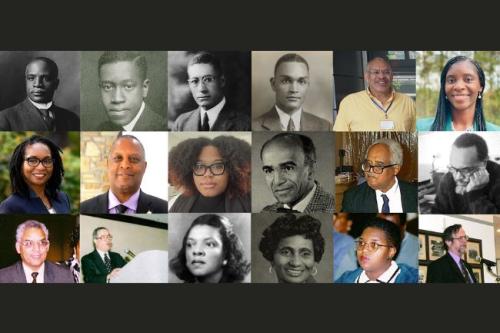 Legacy
LegacyBuilding the Mathematical Mecca: Howard’s Half‑Century of Innovation, Scholarship, and Leadership
Jan 29, 2026 7 minutes -
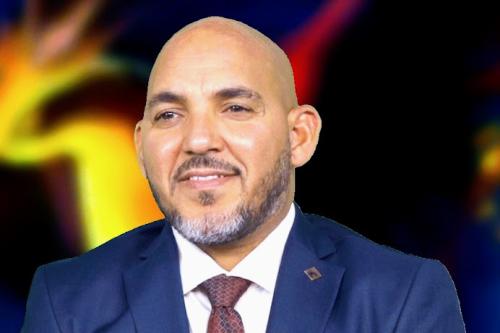
Are You a Member of the Media?
Our public relations team can connect you with faculty experts and answer questions about Howard University news and events.
Submit a Media Inquiry

